Design for Winning
Are you—or do you know—a graphic designer whose work is outstanding? The 2023 PRINT Awards are now open. From PRINT Magazine:
The 2023 PRINT Awards celebrates every detail of design, from the delicate textures and exquisite form of print to digital design that marries technical skill with craftsmanship. No matter what role design plays in our lives, the PRINT Awards winners highlight the best of design and inspire a path to the future for our industry.
…For 2023, PRINT Awards has added two new categories: In-House Design and Design for Social Impact. In-House Design recognizes communication materials created by an in-house team for the organization at which they are employed. Design for Social Impact celebrates campaigns created for nonprofit organizations, or associations that advance social good and include a call to action.
They began accepting entries on November 10, and the deadline is February 28, 2023. More information and entry form here.
Nietzsche Had a Ball
A writing ball, actually. The German philosopher may have written all about the “Superman” but toward the end of his life he was anything but, suffering from not only “incapacitating indigestion, insomnia, and migraines” (oh, who doesn’t?) but also failing eyesight. But he was also at the peak of his writing career. Says Open Culture:
Nietzsche himself declared that writing and reading for more than twenty minutes had grown excessively painful. With his intellectual output reaching its peak during this period, the philosopher required a device that would let him write while making minimal demands on his vision.
The typewriter had been invented by then (this was circa 1881), but he was looking for something portable that he could take when traveling to healthier climes. The Malling-Hansen Writing Ball fit the bill.
In 1865, Danish inventor Rasmus Malling-Hansen invented the “writing ball,” which actually preceded Christopher Latham Sholes’ typewriter by 10 years. When it was shown at the Paris Universal Exhibition in 1878, journalists were ensorcelled.
“In the year 1875, a quick writing apparatus, designed by Mr. L. Sholes in America, and manufactured by Mr. Remington, was introduced in London. This machine was superior to the Malling-Hansen writing apparatus; but the writing ball in its present form far excels the Remington machine. It secures greater rapidity, and its writing is clearer and more precise than that of the American instrument. The Danish apparatus has more keys, is much less complicated, built with greater precision, more solid, and much smaller and lighter than the Remington, and moreover, is cheaper.”
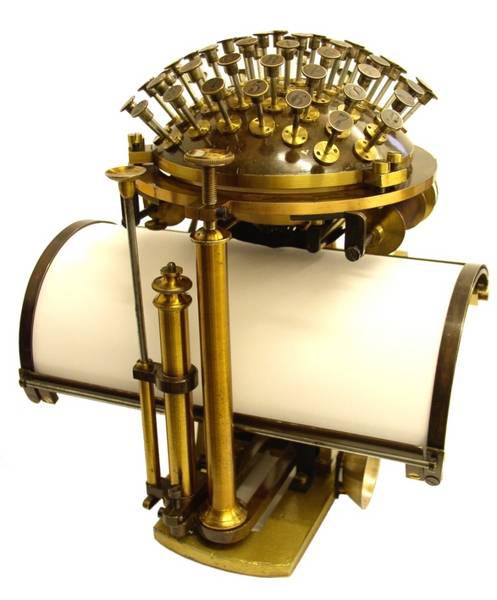
It was considered the 19th-century version of a laptop, and Nietzsche was immediately drawn to it, using it with great enthusiasm and typing upwards of 60 manuscripts on the writing ball, including his ode to typewriting:
“THE WRITING BALL IS A THING LIKE ME:
MADE OF IRON YET EASILY TWISTED ON JOURNEYS.
PATIENCE AND TACT ARE REQUIRED IN ABUNDANCE
AS WELL AS FINE FINGERS TO USE US.”
Alas, his enthusiasm didn’t last long.
According to Eberwein, the philosopher struggled with the device after it was damaged during a trip to Genoa; an inept mechanic trying to make the necessary repairs may have broken the writing ball even further.
If you want far more detail on Nietzsche’s writing ball, you can read all about it the ebook Nietzches Schreibkigel, by Dieter Eberwein, vice-president of the International Rasmus Malling-Hansen Society, published by Typoscript Verlag (download PDF for free here).
Font of Knowledge
We in this industry know how important typography is, especially where branding is concerned. At PRINT magazine, an in-depth interview with Mollie Kendell, Senior Designer at branding agency Lantern, about how the company developed a bespoke typeface for Digital Isle of Man, the type design process in general, and how typography can help elevate a branding system.
Typography can act as the glue to the different components of the branding system and bring together the meaning and voice behind the brand. If the typography choice is built on strategy and ideas, I think this is effective to then evoke the brand’s personality, celebrate its history, and bring emotion from the audience.
Destroy this Page
Via Boing Boing, Crowd-jpeg is a website that “deteriorates” every time someone visits it. (Sounds like Twitter.) Anyway, it’s essentially an image that is compressed each time someone visits it, and it seems the idea is to show what extensive compression does to an image, much like successive generations of a photocopy. This is what an image that has been compressed 27,837 times looks like:

By the way, it works better in Chrome than Safari.
Three Cheers for the Chair
We’re not entirely certain who would use this, but Volkswagen has apparently introduced a motorized office chair that can cruise at about 12 mph and up to 7.5 miles on a single battery charge. If you work in a really big office with lots of long empty corridors, it would be perfect. But that’s not all: it seems to have more features than Volkswagen’s own cars. Says The Verge:
it’s got…360-degree collision avoidance sensors, a backup camera with full guidance, a heated embroidered seat, party lights, a touchscreen display, a USB charger, and a tow hitch. LED headlights, a seatbelt, and a horn come standard. There’s even a “trunk” (a pocket, anyhow) with 0.17 cubic feet of space for documents and / or a laptop.
And, of course, a seat belt. If it could also launch photon torpedoes, that’d be an added bonus.
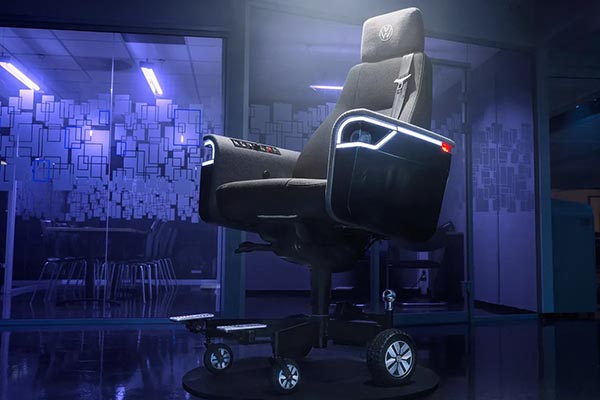
We did check the calendar and it’s not April 1, but it does appear to be a marketing stunt, although they suggest that “it will be available for test drives at various locations.”
The Walls Are Closing In…Really!
One of the most horrific, soul-crushing workplace developments was the advent of the cubicle. But what could be worse than a tiny, non-private cubicle? Yes, one with motorized walls that can follow you around. Says Gizmodo:
WaddleWalls, developed by a team of robotics researchers at Japan’s Tohoku University, is a creation that takes the temporary nature of cubicles and partition walls one step further by automating them and allowing them to roam and navigate a space and set up a semi-private office space only as needed.
… the self-contained robotic partitions can independently navigate an office space through the use of various sensors, but can also work as a larger swarm with other WaddleWalls units to assemble a privacy barrier around a worker on demand. In the morning, users of a shared office space might be more inclined to interact with each other to sort out the day’s goals, while later in the day, they might prefer more privacy to focus on getting work done, or as to not bother others with phone calls.
The system currently relies on a special controller to call the WaddleWalls units over and to orientate them as needed, including adjusting the height of the vertical barrier to increase or decrease privacy. But specific layouts can also be pre-programmed in advance, like a group of private working spaces for multiple users, or a display wall for making presentations, which could be triggered to assemble automatically so there’s far less manual setup involved.
It’s not entirely outlandish, especially if some staff are only in the office part of the time. Or you can use the Volkswagen office chair to outrun the walls.
Auto Correct
Do you like your car? What about Hot Wheels and/or Matchbox cars? If yes to both, now you can combine them and get a Hot Wheels version of your own car. Says Core77:
Trent from JDM Customz can create a Hot-Wheels-esque replica of your exact car. Unlike an actual Hot Wheels version of your ride, Trent nails the details: Your actual paint color, rims, aftermarket add-ons, window tint, et cetera, all in 1:64 scale.
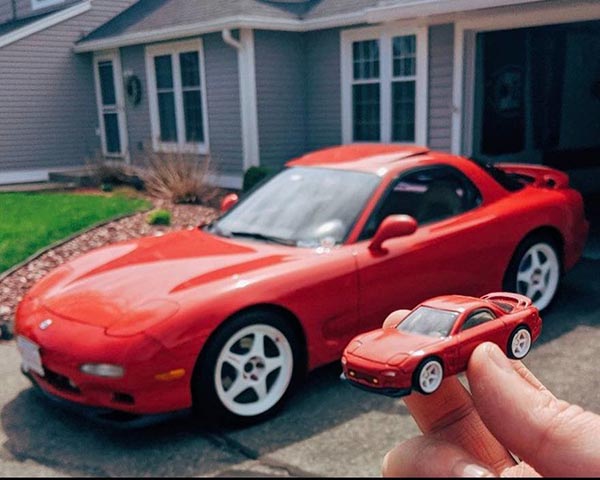
It requires sending him many photos of your car. Reviews on his Etsy shop are generally good, but his vehicle graphics need work. Perhaps a wide-format or signage shop can help him out with some really tiny wraps.
Hard to Portmanteau
A “portmanteau” word is “a word blending the sounds and combining the meanings of two others”—for example, brunch, which is a mashup of breakfast and lunch. Now, via Boing Boing, comes Portmanteur.com, with which you can create your own portmanteau words. We entered battery and licking, just for the heck of it.
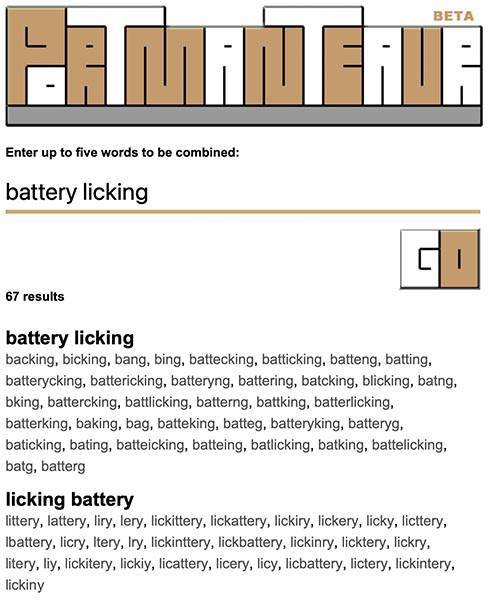
Now, to work these into regular conversation (or Slack thread…).
This can be a useful tool for coming up with pet names—or even children’s names.
Graphene…in…Space!
Was it a good week for graphene news? It’s always a good week for graphene news! Advanced Material Development (AMD), makers of a proprietary thin-film graphene-based coatings technology, just inked a deal with NASA’s Jet Propulsion Laboratory to collaborate on the Europa Clipper project. The technology in question is a Radio Frequency-absorbing nanomaterial that can be applied to a variety of substrates. From (who else?) Graphene-Info:
The collaborative work is planned to be used for the NASA Europa Clipper spacecraft electromagnetic compatibility test campaign. AMD’s materials could help enable the Europa Clipper project to confirm that the spacecraft’s sensitive ice-penetrating radar will operate properly at key frequencies so as to meet science objectives.
The Europa Clipper spacecraft will perform dozens of close flybys of Jupiter’s moon Europa, gathering detailed measurements from multiple instruments, including the radar instrument, to investigate whether the moon could have conditions suitable for life. Europa Clipper’s primary objective is to determine whether there are places below Europa’s surface that could support life.
Around the Webb, Part the Continuation: Like Sands Through the Hourglass
The James Webb Space Telescope is up and running and recently turned its gaze toward the “protostar” located within the dark cloud L1527, potentially shedding light (as it were) on new star formation. Says NASA:
The region’s most prevalent features, the clouds colored blue and orange in this representative-color infrared image, outline cavities created as material shoots away from the protostar and collides with surrounding matter. The colors themselves are due to layers of dust between Webb and the clouds. The blue areas are where the dust is thinnest. The thicker the layer of dust, the less blue light is able to escape, creating pockets of orange.
Webb also reveals filaments of molecular hydrogen that have been shocked as the protostar ejects material away from it. Shocks and turbulence inhibit the formation of new stars, which would otherwise form all throughout the cloud. As a result, the protostar dominates the space, taking much of the material for itself.
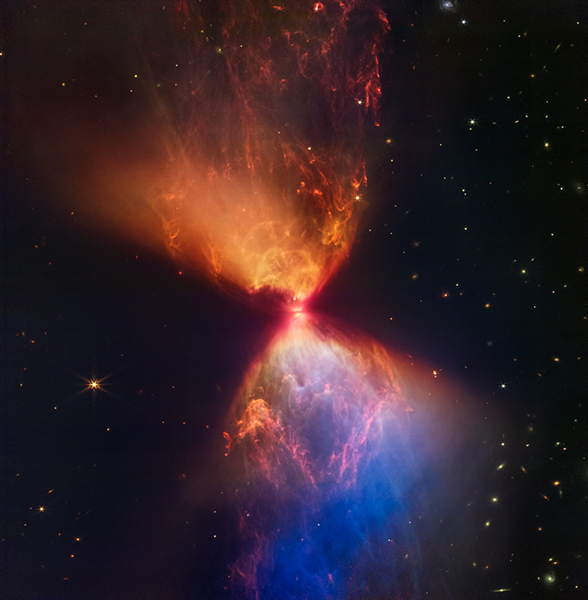
Caption from NASA: The protostar within the dark cloud L1527, shown in this image from NASA’s James Webb Space Telescope Near-Infrared Camera (NIRCam), is embedded within a cloud of material feeding its growth. Ejections from the star have cleared out cavities above and below it, whose boundaries glow orange and blue in this infrared view. The upper central region displays bubble-like shapes due to stellar “burps,” or sporadic ejections. Credits: NASA, ESA, CSA, and STScI. Image processing: J. DePasquale, A. Pagan, and A. Koekemoer (STScI)
L1527 is only a mere 100,000 years old—younger even than a toddler in astronomical terms, and the protostar can’t yet generate its own energy through the nuclear fusion of hydrogen, which is what makes a star a star. As it accretes more mass and compresses, it will eventually be able to reach “stardom.”
The disk, seen in the image as a dark band in front of the bright center, is about the size of our solar system. Given the density, it’s not unusual for much of this material to clump together - the beginnings of planets. Ultimately, this view of L1527 provides a window into what our Sun and solar system looked like in their infancy.
The things we can do.
Kings of Carrot Flowers
Fans of 1990s alternative music may or may not recognize the name Elephant 6 (full name Elephant 6 Recording Company), which was an ersatz collection of American bands such as Neutral Milk Hotel, Apples in Stereo, Of Montreal, and others, whose members often recorded and/or toured with each other in various combinations. Now, director Chad Stockfleth has filmed a documentary about this notoriously reclusive bunch. Says Boing Boing:
it includes some rare interviews with some of the more reclusive artists from the Elephant 6 lineup, such as Jeff Mangum of Neutral Milk Hotel. If you’re into early 90s alternative alt-rock, this is a huge deal. The film is finally getting a world premiere this week at the DOC NYC Film Festival, with other screenings to follow at Denver Film Festival and Sound Unseen in Minneapolis.
Rocky Mountain High
The trend toward food and beverage brands getting into products that have nothing to do with food and beverages continues. Now, Coors has partnered with Le Chat, a nail polish manufacturer, to produce Chill Polish. Says Food & Wine:
Different styles of beers have different ideal serving temperatures. But for Coors Light, only one temp will suffice: “as cold as the Rockies.” To hammer that point home, since 2007, the brand has offered color-changing labels to let drinkers know when their Coors Light is properly chilled.
Actually, we are not fans of Coors Light, so we never knew this. Anyway, they have taken the idea even further:
“But what about when you’re drinking Coors Light in a pint glass?” the brand asked. With that in mind, the brewing giant teamed up with the nail polish experts at Le Chat to create a color-changing polish that goes from gray to blue when its temperature drops to a level acceptable for drinking a Coors Light.
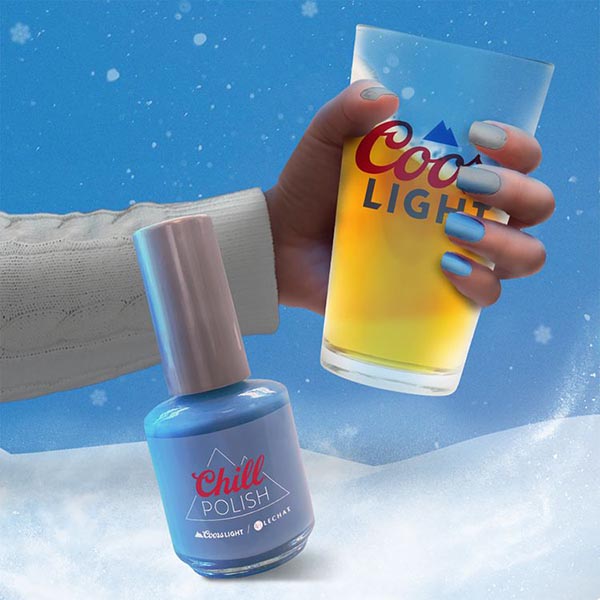
We get that it’s really a marketing gimmick, but presumably if the temperature of the glass can make nail polish change color, you should just simply be able to feel how cold the glass is. (And if your fingers turn blue and you’re not wearing the nail polish, it’s probably too cold.) And logically this would work with other beers, if you were really sensitive to the temperature of your beer.
This Week in Printing, Publishing, and Media History
November 14
1840: French painter Claude Monet born.
1851: Herman Melville’s novel Moby-Dick is published in the U.S.
1889: Pioneering female journalist Nellie Bly (aka Elizabeth Cochrane) begins a successful attempt to travel around the world in less than 80 days. She completes the trip in 72 days.
1916: American screenwriter and producer Sherwood Schwartz born.
1922: The British Broadcasting Company begins radio service in the United Kingdom.
1952: The first regular UK Singles Chart is published by the New Musical Express.
1967: American physicist Theodore Maiman is given a patent for his ruby laser systems, the world’s first laser.
November 15
1926: The NBC radio network launches with 24 stations.
1968: The Cleveland Transit System becomes the first transit system in the western hemisphere to provide direct rapid transit service from a city's downtown to its major airport.
1971: Intel releases the world’s first commercial single-chip microprocessor, the 4004.
November 16
534: Justinian I, who was an Eastern Roman (Byzantine) emperor in Constantinople, approves and publishes the second and final revision of the Codex Justinianus.
1889: American director, producer, and playwright George S. Kaufman born.
1904: English engineer John Ambrose Fleming receives a patent for the thermionic valve (aka the vacuum tube).
1914: The Federal Reserve Bank of the United States officially opens.
1938: LSD is first synthesized by Albert Hofmann from ergotamine at the Sandoz Laboratories in Basel.
November 17
1749: French chef Nicolas Appert born. He invented the principle of canning.
1790: German mathematician and astronomer August Ferdinand Möbius born. (It’s not true that his life had no beginning and no end.)
1839: Oberto, Giuseppe Verdi's first opera, opens at the Teatro alla Scala in Milan, Italy.
1944: College basketball coach Jim Boeheim born.
1947: American scientists John Bardeen and Walter Houser Brattain observe the basic principles of the transistor, a key element for the electronics revolution of the 20th century.
1968: Viewers of the Raiders–Jets football game in the eastern United States are denied the opportunity to watch its exciting finish when NBC broadcasts Heidi instead, prompting changes to sports broadcasting in the U.S.
2019: The first known case of COVID-19 is traced to a 55-year-old man who had visited a market in Wuhan, Hubei Province, China. And so it begins…
November 18
1787: French physicist and photographer, and inventor of the daguerreotype, Louis Daguerre, born.
1836: English playwright and poet W. S. Gilbert born.
1865: Mark Twain’s short story “The Celebrated Jumping Frog of Calaveras County” is published in the New York Saturday Press.
1883: American and Canadian railroads institute five standard continental time zones, ending the confusion of thousands of local times. Well, it was about time.
1922: French author and critic Marcel Proust dies (b. 1871).
1928: Release of the animated short Steamboat Willie, the first fully synchronized sound cartoon, directed by Walt Disney and Ub Iwerks, featuring the third appearances of cartoon characters Mickey Mouse and Minnie Mouse. This is considered by the Disney corporation to be Mickey’s birthday.
1963: The first push-button telephone goes into service.
November 19
1909: Austrian-American theorist, educator, and author Peter Drucker born.
1916: Samuel Goldwyn and Edgar Selwyn establish Goldwyn Pictures.
1954: Télé Monte Carlo, Europe’s oldest private television channel, is launched by Prince Rainier III.
1955: National Review publishes its first issue.
1959: The Ford Motor Company announces the discontinuation of the unpopular Edsel.
1967; The establishment of TVB, the first wireless commercial television station in Hong Kong.
1998: Vincent van Gogh’s Portrait of the Artist Without Beard sells at auction for US$71.5 million.
2006: Nintendo's first video game console with motion control, the Wii, is released.
November 20
1805: Beethoven's only opera, Fidelio, premieres in Vienna.
1908: British-American journalist and author Alistair Cooke born.
1910: Russian author and playwright Leo Tolstoy dies (b. 1828).
1924: Polish-American mathematician and economist, and coiner of the term “fractal,” Benoit Mandelbrot born.
1936: American novelist, essayist, and playwright Don DeLillo born.
1969: The Plain Dealer publishes explicit photographs of dead villagers from the My Lai Massacre in Vietnam.
1985: Microsoft Windows 1.0 is released.










Discussion
Join the discussion Sign In or Become a Member, doing so is simple and free